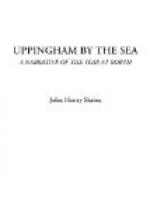Next morning the school was called together, and the Headmaster addressed them, feeling, perhaps, somewhat like a general publishing a manifesto to his troops before a campaign. It was a great experiment, he said, in which they were sharing; let them do their best to make the result a happy one for themselves, and for the people among whom they had come. They were “making history,” for this experience was a wholly new one, which might not impossibly prove helpful some day to others in like circumstances.
It is pleasant to record that the appeal was not wasted.
At the dinner-hour to-day, the full numbers being now on the spot, the resources of the commissariat were put to the test. Some anxiety was relieved when the supply proved sufficient; it would have been small cause for reproach if the caterers had failed in their estimate on the first experiment. But of the commissariat we shall say more presently.
The secondary necessities of life, fire and light, were not forthcoming with quite the same promptness. There was a twilight period in many houses before lamps were furnished in sufficient abundance. The place of fuel was supplied by the genial weather of the first week; and perhaps few were aware of what we were doing without. Next week the east winds and the coal arrived together.
The hotel laundry found the task it had undertaken beyond its strength. No wonder. Three hundred sets of articles de linge reach a figure of which our hosts had hardly grasped the significance. We are sometimes told that Gaels and Cymry cannot count. At any rate, when the bales of linen came pouring in upon them, heaping every table and piling all the floor, and still flowing in faster than room could be found, the laundresses, brave workers though they were, felt that the game was lost:
They stand in pause where they should
first begin,
And all neglect.
One poor nymph was discovered by a compassionate visitor dissolved in tears over her wash-tub. Such misery could not be permitted; and we transferred half the task at once to the laundries of Aberystwith.
On the afternoon of this day took place the distribution of “studies.” That is to say, some sixty or eighty boys (a number more than doubled afterwards), in order to relieve the pressure on our sitting-rooms, were billeted upon some of the village people, who let their rooms for the purpose. From two to six boys were assigned to each room according to its capacity. We shall speak again of these studies. Here we will only pause to thank our good landladies for the intrepidity with which they threw their doors open to the invasion, the more so as they mostly claimed to belong to the category of “poor widows”—a qualification upon which they were disposed to set a price in arranging their charges. Their daring proved no indiscretion. The writer, who has the honour of knowing them all, was the depositary of




